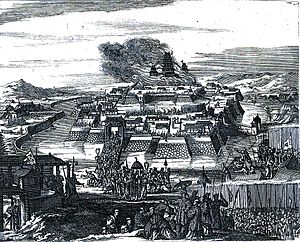The siege of Osaka (大坂の役, Ōsaka no Eki, or, more commonly, 大坂の陣 Ōsaka no Jin) was a series of battles undertaken by the Japanese Tokugawa shogunate against the Toyotomi clan, and ending in that clan's destruction. Divided into two stages, the winter campaign and the summer campaign, it lasted from 1614 to 1615. The siege put an end to the last major armed opposition to the establishment of the Tokugawa shogunate. The end of the conflict is sometimes called the Genna Armistice (元和偃武, Genna Enbu), because the era name was changed from Keichō to Genna immediately following the siege.
